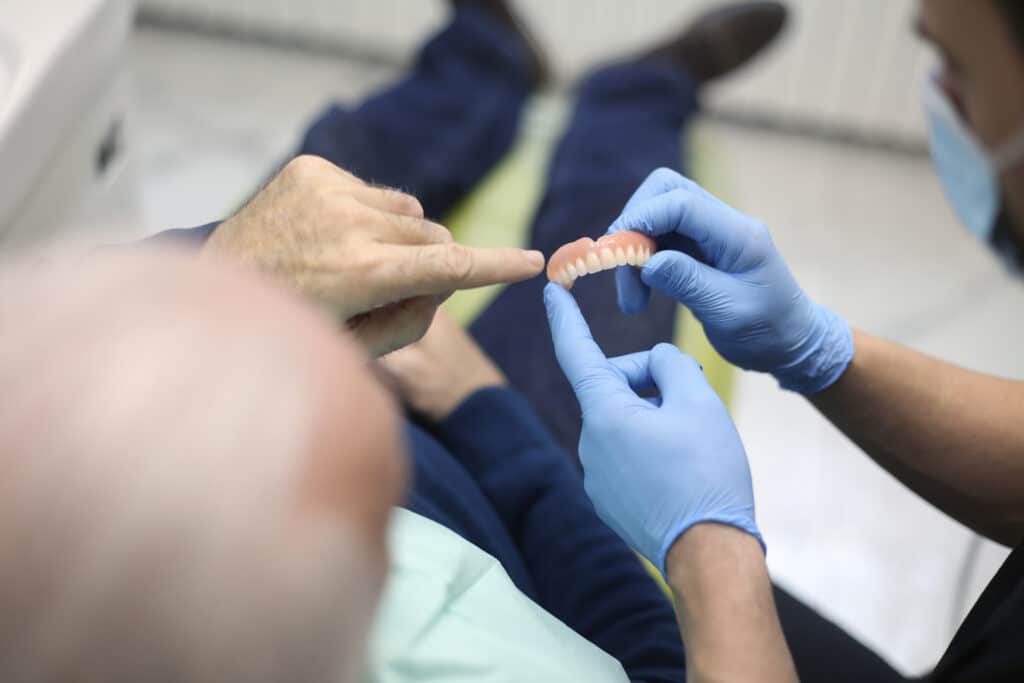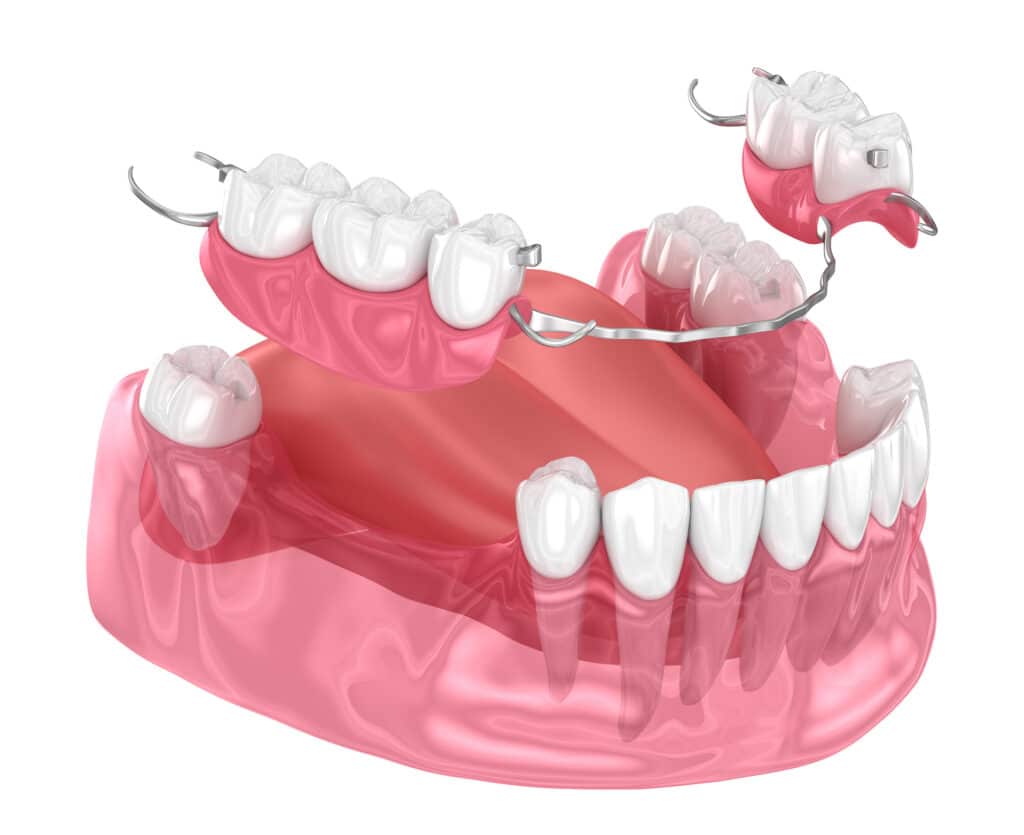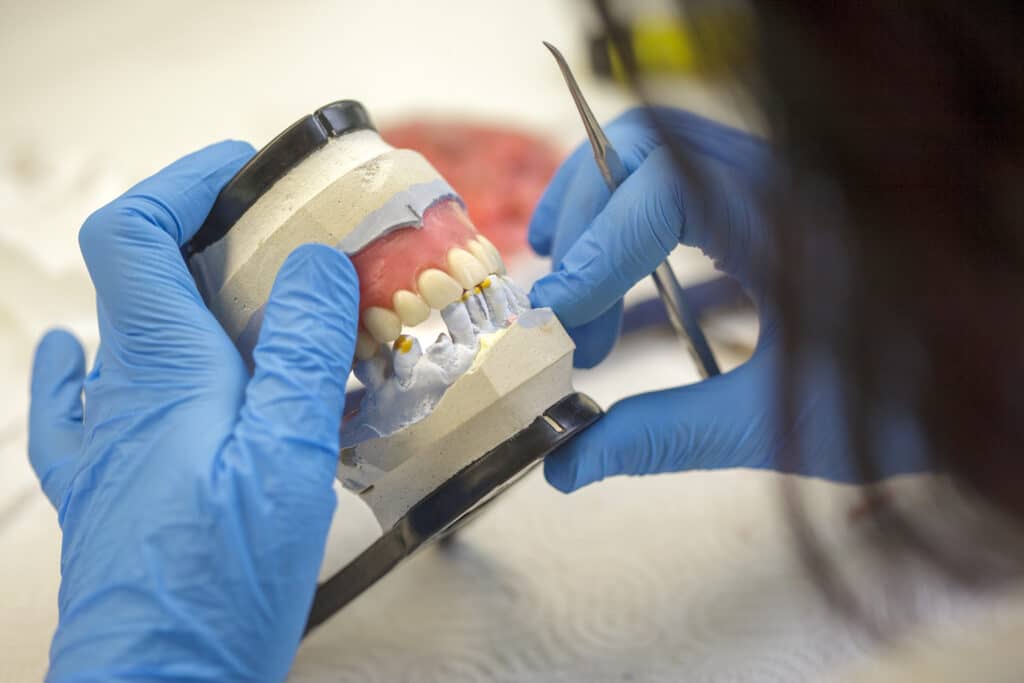
Dentures have helped millions of people around the world regain their ability to chew and speak after losing teeth. Some people have lost all or most of their teeth, and others have lost a few teeth in one area. But how do dentures work? Let’s take a closer look at this interesting and essential invention.
How Do Dentures Work?
Dentures are removable dental appliances designed to replace missing teeth and restore oral functionality and aesthetics. These prosthetic devices play a crucial role in improving speech, chewing ability, and overall facial appearance for individuals who have lost their natural teeth. Dentures have been used for thousands of years, with some of the earliest evidence dating back to the 7th century BC. Early dentures were made from metal, wood, ivory, or human teeth, but today’s dentures are much more comfortable and usable.
There are several different types of dentures, and each one works a bit differently. We’ll discuss this in more detail in the next sections. In general, dentures work by replacing natural teeth with prosthetic teeth. Today, these are usually made from strong, heat-cured acrylic materials with coloring agents that mimic the appearance of teeth and gums. Dentures can be anchored in place by using implants or connections with neighboring teeth, or they can be adhered into place using denture adhesive. Once the dentures are securely in place, the wearer can chew and speak comfortably again.
Different Types of Dentures
Partial Dentures
Partial dentures are used when some natural teeth remain in the upper or lower jaw. They consist of replacement teeth attached to a acrylic, gum-colored base. Partial dentures may be secured in place using clasps that attach to existing teeth, providing stability and preventing movement.
If a group of teeth have been lost or damaged in the same part of your mouth, partial dentures can be a great solution. Some partial dentures are removable, and they’re secured by using denture adhesive, or by attaching to neighboring, healthy teeth. Partial dentures can also be permanently fixed into place by using dental implants. In some cases, patients prefer to replace the teeth completely with dental implants. When comparing partial dentures and implants, talk to your dentist about your options, and what’s best for your teeth and gums.
Full Dentures
Full dentures, also called complete dentures or conventional dentures are used when most of the natural teeth are missing. They may be used for the upper teeth, lower teeth, or both. Full dentures are crafted and fitted after the remaining teeth are removed, and the gums have healed. This process typically takes a few weeks, during which time the patient may be without teeth, or may use a temporary set of dentures.
Though a person’s natural teeth are obviously best, there are many benefits of dentures if the natural teeth are missing or damaged. A full set of dentures can make it possible to chew and speak comfortably again. Dentures also look like natural teeth, so they can renew your smile as well. Compared to a complete set of dental implants, dentures are more affordable, and require fewer procedures. With a payment plan, you can budget for dentures more easily and pay for the procedure using monthly payments.
All-On-X Implant Supported Dentures
All-On-X implant secured dentures, most commonly referred to as All-on-x-implants, are a revolutionary approach to full-arch tooth replacement. This technique involves attaching a complete set of prosthetic teeth to four or six dental implants per arch. The prosthetic teeth permanently attach to dental implants, which holds them in place without the need for denture adhesive.
Compared to a full set of individual implants, All-on-X dentures significantly reduce the number of implants required to fully restore teeth. This process also accelerates the overall treatment and healing process. All-on-X dentures provide exceptional stability and functionality that is most similar to your natural teeth, making them a popular choice for those seeking a more permanent and secure solution. Since they attach to the jaw bone, the implants also help to reduce bone loss that often occurs with removable dentures.
Which Dentures Are Right For You?
Choosing the right type of dentures depends on various factors, including your oral health, lifestyle, and personal preferences. Here are some considerations:
- Partial dentures: Ideal when some natural teeth are still present and in good condition. They are removable and easy to clean.
- Full dentures: Suitable for individuals who have lost all or most of their natural teeth. This option is generally more affordable and offers faster healing time than implants.
- All-on-X dentures: A great option for those seeking a stable, high function and low maintenance long-term solution without the need for individual implants for each missing tooth.
It’s essential to consult with a dentist to determine the most suitable denture option based on your specific needs and circumstances. Regular check-ups and adjustments may be necessary to ensure optimal comfort and functionality. If you’re curious about dentures of any type, our experts can help. Make an appointment today at a BDG dentist’s office near you.


